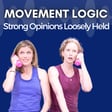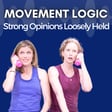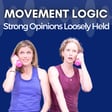
52: What Stopped You from Lifting - 7 Guests Share their Stories
Welcome to Season 3, Episode 52 of the Movement Logic podcast. In this episode, Laurel and Sarah are joined by seven other guests for a panoramic, multi-perspective answer to the question “why don't more women lift weights?” Our seven guests (all of whom are movement professionals) weigh in on their previous objections to strength training. Of course they also share their impetus for starting to lift, and how it changed their lives.
Sign up here for the Live Strength Training Webinar on Sept 14th with 30 day replay.
Sign up here for our Free Barbell Mini-Course + our Free Barbell Equipment Guide
Our guests on Instagram:
Maryann Thompson @maryannthomsonpilates
Diana Romero @insprana.yoga
Naomi Gottlieb-Miller @conscioushealthymama
Lisa Schwarcz Zlotnick @lisazlotnick
Kathy Dodd @kdnaturalyoga
Trina Altman @trinaaltman
Alex Ellis on Instagram @hollaformala on Tik Tok @aewellness
Episode 47: Our Oopsie Stories from the Teaching Trenches
Sarah’s barbell equipment Post 1 and Post 2 on Instagram
Books about fitness culture:
Fit Nation: The Gains and Pains of America's Exercise Obsession


